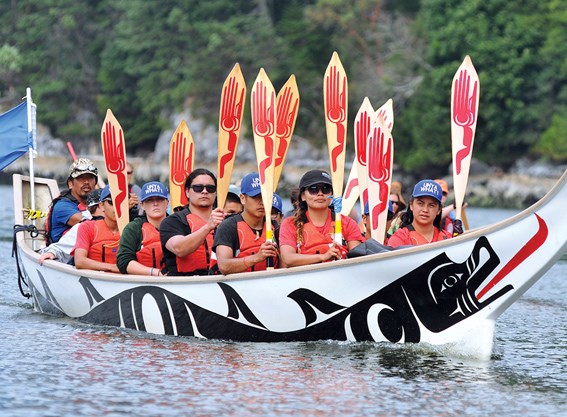More than 30 canoes filled with First Nations, police, public agency workers and youth have joined forces over the last week for a journey by water from the Sunshine Coast to Vancouver. You can call them canoe paddlers if you want, but for a brief period “family” might be a more accurate term.
The West Vancouver Police Department and other groups have been taking part in the 17th annual Pulling Together Canoe Journey, an annual 10-day excursion that blends together culture, indigenous spirituality and teamwork as paddlers make stops along the way to different First Nations communities to learn their customs and history.
This year’s 10-day canoe journey has taken paddlers to communities in Sechelt, Gibsons, Cache Creek, Squamish, Porteau Cove, and to the Lower Mainland.
Wes Nahanee, a cultural adviser with Pulling Together and Squamish Nation member, said that canoeing is an essential and defining quality of Pacific Northwest indigenous people, in large part because it’s an act that can bring families together and help foster community.
“You’ve got to work together as one, so you get police officers and youth together and they’ve got to learn how to bring that canoe forward in a good way,” Nahanee said.
Last year, West Vancouver police and Squamish Nation members held an awakening ceremony for the canoe Ch’ich’iyúy on the shores of Ambleside Park.
Nahanee said he was part of that effort. He said that the canoe, as well as the Pulling Together journey, is part of a process for “making better relations and working together” between police and First Nations communities – especially between indigenous youth and law enforcement.
“I’ve seen a lot of change in the youth with their attitudes, just getting to know police officers in a good way,” he said.
The canoe Ch’ich’iyúy now belongs to West Vancouver police, who use the watercraft as a symbol for improved relations between the department and Squamish Nation, as well as a community engagement tool.
The fitting namesake of the 29-foot canoe signifies the story of twin Squamish Nation sisters fostering peace between Squamish and Haida people during a time of instability.
About a dozen people, including police and youth, were part of the West Vancouver police canoe team.
Last year, the department took Ch’ich’iyúy for its inaugural Pulling Together Canoe Journey that started with a sendoff in Mount Currie and travelled along Lillooet and Harrison lakes to the Fraser River.
But this year the canoe journey is particularly noteworthy for West Vancouver police because the canoe trip has had a stopover at Horseshoe Bay, where Squamish Nation played host.
On Wednesday, dozens of tents were pitched on Squamish Nation’s Capilano Reserve Park and tired canoeists representing several police departments, public agencies and First Nations set up camp.
West Vancouver Police Department Chief Const. Len Goerke has participated in Pulling Together journeys in the past and said this year was particularly important because of the Truth and Reconciliation Commission, which has several recommendations when it comes to policing and education.
Goerke said it was important for him and his department to continue to forge strong relationships with the local Squamish Nation.
“We police the First Nations community, we’re partners with them, and we’re really proud of that fact.
“It’s an important part of what we do,” said Goerke.
One of the aspects of Pulling Together that Goerke was most positive about was the way that youth are impacted by the canoe journey, and having conversations with First Nations about challenges and oppressions they had experienced.
“Over the last week, they have heard elders in residential schools talk to them directly about that,” he said. “You can’t sit and talk to somebody like that and walk away the same person.”
Will Honcharuk said last year he tried canoeing for the first time when he joined up with Pulling Together on behalf of the West Vancouver police squad.
The 18-year-old recent West Vancouver Secondary graduate didn’t know what to expect, but he was encouraged by his desire to learn more about the First Nations experience, especially because his grandfather came from an indigenous background.
“It was a definite learning experience for me, but it ended up being something that I’ve continued to do throughout the year. I like that it gives you a chance to connect with other people,” Honcharuk said.
From speaking with First Nations elders and community members, he said he had come to appreciate their values, such as respecting elders, the environment and community.
Yesterday, Pulling Together canoeists hopped back on board and paddled from Horseshoe Bay to Ambleside.
On Saturday, the group is canoeing to Lumberman’s Arch in Stanley Park, historically a communal meeting place in Coast Salish culture.
After one last gathering, the journey will come to an end and canoeists from throughout the province will depart for home, ready for next year’s paddle.



